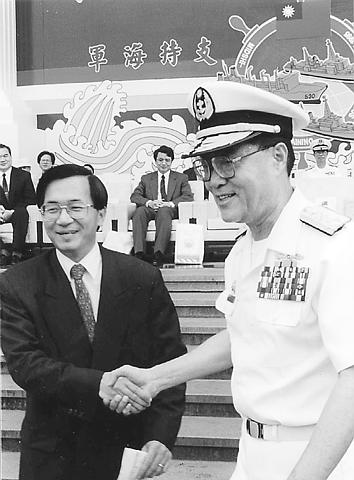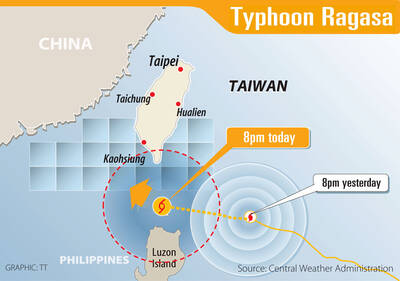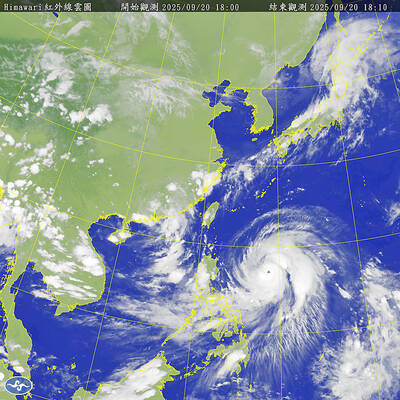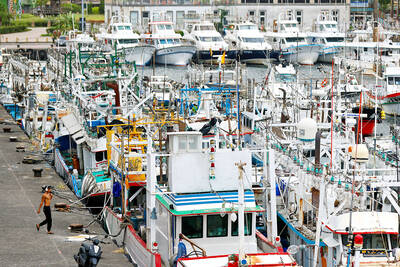With Chief of the General Staff, General Tang Yao-ming (湯曜明) having refused to fill the defense minister position, it appears increasingly likely that Taiwan's representative in Holland, ex-Navy Commander-in-Chief Ku Chung-lien (顧崇廉) will take the position, defense officials said yesterday.
The likelihood that Ku would become defense minister increased after President-elect Chen Shui-bian (陳水扁) said yesterday that his main selection criteria is to keep a balance of power between the services.
Chen reportedly made the statement during a meeting with Ni Chang-yi (黎昌意), son of the ex-chief of the general staff (CGS), and with current strategic advisor to the President, Ni Yue-si (黎玉璽). Chen said he visited Ni to pay his respects and to seek advice from the retired admiral.

FILE PHOTO FROM THE LIBERTY TIMES.
Ni, 86, is the second naval general and former-CGS that Chen has visited since winning the presidential election on March 18.
Previously, Chen visited former naval leader and ex-CGS Liu Ho-chien (劉和謙), to whom Chen promised a place in the presidential office as a consultant.
Chen's visits to the two retired naval leaders were the only visits he made openly to former military leaders. Analysts say that this shows Chen's preference for the navy in his plans for armed forces development in the next four years.
Chen's desire to maintain a "balance of power" between the services would be met if he appoints Ku as the next defense minister. Chen has already settled arrangements for the air force and the army leadership by selecting Tang Fei (唐飛), from the air force, as premier, and by keeping incumbent CGS army General Tang Yao-ming in his current position.
A high-ranking official with the Ministry of National Defense (MND), who declined to be identified, said Chen also has personal reasons for choosing Ku for the defense minister post.
The two developed good relations seven years ago when Ku was vice defense minister and Chen was a lawmaker for the opposition DPP, the official said.
"The relations between the two got even better after Ku took over the command of the navy from Chuang Ming-yao (莊銘耀), who stepped down because of the murder of subordinate captain Ying Ching-feng (尹清楓)," the official said. "Ku often invited Chen, who then was Taipei mayor, to attend naval ceremonies as an honored guest, a move which aroused complaints from the conservative military leadership."
Although Chuang is also a possible candidate for defense minister, his chances are slim because the Yin murder case remains unsolved, the official said.
Su Chin-chiang (蘇進強), a military analyst at Nanhua University, said that if Chen appoints Ku as the new defense minister, there will be two main implications.
"First, Chen appreciates and trusts Ku's ability and willingness to negotiate with and listen to opinions of people outside the military. It is this same quality that he values in Tang Fei and both Tang and Ku will be able to help Chen implement the new Defense Law and Organization Law for the MND," Su said.
Second, "the move indicates a new direction for arms build-up in the future. Taiwan will need a stronger air force and navy. No other island country puts so much emphasis on the army as Taiwan does now," he said.

One of two tropical depressions that formed off Taiwan yesterday morning could turn into a moderate typhoon by the weekend, the Central Weather Administration (CWA) said yesterday. Tropical Depression No. 21 formed at 8am about 1,850km off the southeast coast, CWA forecaster Lee Meng-hsuan (李孟軒) said. The weather system is expected to move northwest as it builds momentum, possibly intensifying this weekend into a typhoon, which would be called Mitag, Lee said. The radius of the storm is expected to reach almost 200km, she said. It is forecast to approach the southeast of Taiwan on Monday next week and pass through the Bashi Channel

WARNING: People in coastal areas need to beware of heavy swells and strong winds, and those in mountainous areas should brace for heavy rain, the CWA said The Central Weather Administration (CWA) yesterday issued sea and land warnings for Typhoon Ragasa, forecasting that it would continue to intensify and affect the nation the most today and tomorrow. People in Hualien and Taitung counties, and mountainous areas in Yilan and Pingtung counties, should brace for damage caused by extremely heavy rain brought by the typhoon’s outer rim, as it was upgraded to a super typhoon yesterday morning, the CWA said. As of 5:30pm yesterday, the storm’s center was about 630km southeast of Oluanpi (鵝鑾鼻), Taiwan’s southernmost tip, moving northwest at 21kph, and its maximum wind speed had reached

The Central Weather Administration (CWA) yesterday said that it expected to issue a sea warning for Typhoon Ragasa this morning and a land warning at night as it approached Taiwan. Ragasa intensified from a tropical storm into a typhoon at 8am yesterday, the CWA said, adding that at 2pm, it was about 1,110km east-southeast of Oluanpi (鵝鑾鼻), Taiwan’s southernmost tip. The typhoon was moving northwest at 13kph, with sustained winds of up to 119kph and gusts reaching 155kph, the CWA Web site showed. Forecaster Liu Pei-teng (劉沛滕) said that Ragasa was projected to strengthen as it neared the Bashi Channel, with its 200km

PUBLIC ANNOUNCEMENTS: Hualien and Taitung counties declared today a typhoon day, while schools and offices in parts of Kaohsiung and Pingtung counties are also to close Typhoon Ragasa was forecast to hit its peak strength and come closest to Taiwan from yesterday afternoon through today, the Central Weather Administration (CWA) said. Taiwan proper could be out of the typhoon’s radius by midday and the sea warning might be lifted tonight, it added. CWA senior weather specialist Wu Wan-hua (伍婉華) said that Ragasa’s radius had reached the Hengchun Peninsula by 11am yesterday and was expected to hit Taitung County and Kaohsiung by yesterday evening. Ragasa was forecast to move to Taiwan’s southern offshore areas last night and to its southwestern offshore areas early today, she added. As of 8pm last night,